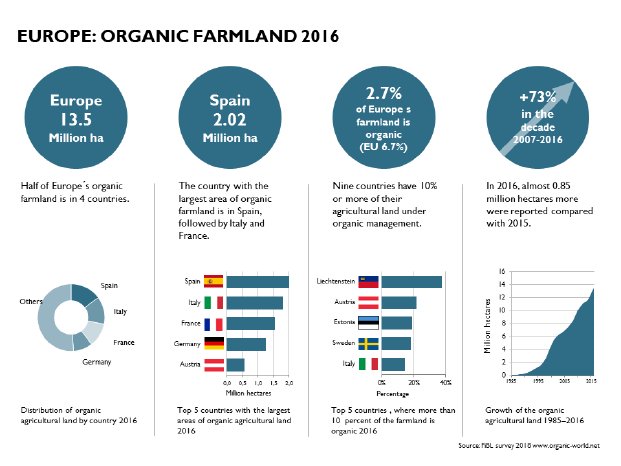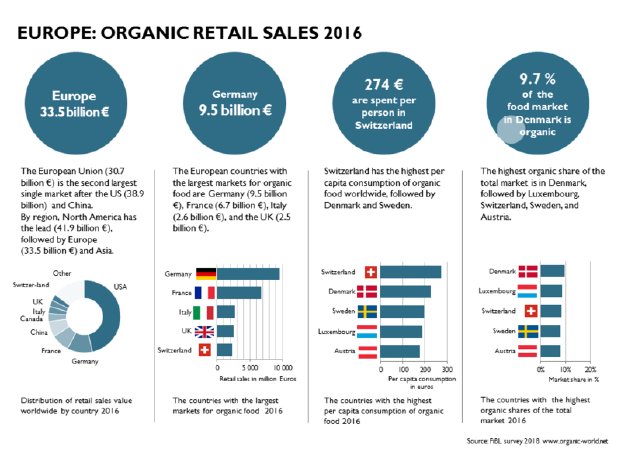Also in 2016, the European organic sector experienced strong growth in terms of area, producers, and markets.
Almost 14 million hectares of farmland are organic in Europe – Spain has the largest area
In Europe, 13.5 million hectares were organic in 2016 (European Union: 12.1 million hectares). With more than 2 million hectares, Spain continues to be the country with the largest organic area in Europe, followed by Italy (1.8 million hectares) and France (1.5 million hectares).
Organic farmland increased by almost one million hectares
The organic land increased by almost one million hectares, representing an increase of 6.7 percent in Europe and 8.2 percent in the European Union. Growth was higher than in 2015 and substantially higher than in the first years of the current decade. In 2016, Italy reported over 300’000 hectares more than in 2015, and France reported over 200’000 hectares more.
Liechtenstein is the country with the highest organic share of the total farmland in the world
Organic farmland in Europe constitutes 2.7 percent of the total agricultural land and 6.7 percent in the European Union. In Europe (and globally), Liechtenstein has the highest organic share of all farmland (37.7 percent) followed by Austria, the country in the European Union with the highest organic share of agricultural land (21.9 percent). Nine European countries reported that at least 10 percent of their farmland is organic.
Organic producers on the rise
There were more than 370‘000 organic producers in Europe (European Union: almost 300'000), and the largest numbers were in Turkey (almost 68'000) and Italy (more than 64'000). The number of producers grew by 7 percent in Europe (10 percent in the European Union) in 2016.
Strong growth of processors and importers
There were almost 66’000 processors in Europe and almost 63’000 in the European Union. Almost 4’700 importers were counted in Europe and almost 4‘000 in the European Union. Particularly strong growth was noted for importers, which increased by double digits in both Europe and the European Union. The country with the largest number of processors was Italy (almost 17‘000), while Germany had the most importers (almost 1'600).
Retail sales surpass the 30 billion euro mark in the European Union
Retail sales in Europe were valued at 33.5 billion euros (30.7 billion euros in the European Union). The European Union represents the second largest single market for organic products in the world after the United States.
Double-digit growth rates of retail sales in 2016
The European market recorded a growth rate of 11 percent (European Union: 12 percent), which is the second time retail sales have had a double-digit growth rate since the financial crisis. Among the key markets, the highest growth was observed in France (22 percent). In the decade 2007-2016, the value of European and European Union markets has more than doubled.
European consumers spend more on organic food
In Europe, consumers spent 41 euros on organic food per person (European Union: 61 euros). Per capita consumer spending on organic food has doubled in the last decade. The Swiss spent the most money on organic food (274 euros per capita).
Organic market shares now approaching the ten percent mark in some countries
Globally, European countries account for the highest shares of organic food sales as a percentage of their respective food markets. Denmark has the highest organic share (9.7 percent) worldwide. Individual products and product groups hold even higher shares. Organic eggs, for instance, constitute more than 20 percent of the value of all eggs sold in several countries.
The survey on organic farming in Europe was conducted by FiBL and AMI. The FiBL data collection activities were carried out under the framework of the global survey on organic farming supported by the Swiss State Secretariat for Economic Affairs (SECO), the International Trade Centre (ITC), NürnbergMesse, and IFOAM – Organics International.
Further information
Contacts
- Dr. Helga Willer, Coomunication, FiBL Switzerland
- Diana Schaack, AMI – Agricultural Market Information Company, Dreizehnmorgenweg 10, 53175 Bonn, Germany
Phone +49 228 33805-0, diana.schaack(at)ami-informiert.de, www.ami-informiert.de
- organic-world.net: Download "The World of Organic Agriculture 2018"
- ifoam-eu.org: Interactive infographics and the latest market and area data
- organic-world.net: Infographics
- statistics.fibl.org: FiBL statistics on organic agriculture worldwide
- organic-world.net/yearbook.html: Yearbook "The World of Organic Agriculture"
- fibl.org: Website of FiBL, the Research Institute of Organic Agriculture
- ami-informiert.de: Website of AMI, the Agricultural Market Information Company
- ifoam-eu.org: Website of IFOAM EU, the European Group of IFOAM – Organics International
- biofach.de: Website of BIOFACH
The yearbook "The World of Organic Agriculture" can be obtained at BIOFACH at the FiBL stand in Hall 1 (stand 553). The book includes a detailed chapter about organic in Europe, with many tables and graphs.
Data can be explored through online interactive infographics available on IFOAM EU’s website or by visiting IFOAM EU at BIOFACH Hall 1, stand 451.
The BIOFACH session on the European organic market takes place on February 14, 2018, from 5 to 5:45 pm in room Kiew, NCC East, Nürnberg Exhibition Centre. (For programme see below).
Programme of the session "The European market for organic food" at BIOFACH 2018
Wednesday, February 14, 2018, 5:00 to 5:45 pm, Room Kiew (NCC East), NürnbergMesse, Nuremberg
- Dr. Susanne Padel, The Organic Research Centre, UK, Moderator
- Marc Arnaud, Agence BIO, France
- Lee Holdstock, Soil Association, UK
- Diana Schaack, Agrarmarkt Informations-Gesellschaft mbH (AMI), Germany
- Dr. Helga Willer, Research Institute of Organic Agriculture FiBL, Switzerland
- Prof. Dr. Raffaele Zanoli, Professore Ordinario Università Politecnica delle Marche, D3A, Italy


